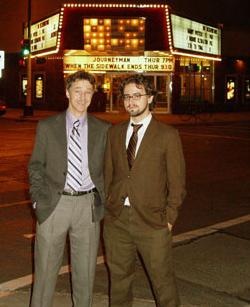Why Fatherless Boys Go Bad
Documentary Journeyman Looks at the Perilous Lives of Boys with No Dads

“We’re never gonna replace your dad are we?” Craig McClain, co-founder of Boys to Men Mentoring Network, asks a teenage boy in a room filled with boys and their mentors, “But how about 70 uncles?”
This is the question at the heart of Journeyman. Directed by Kevin Obsatz and Charlie Borden, the moving documentary explores the enormous pressures faced by boys who have no fatherly guidance in their lives. From drugs to violence to depression, these young men deal with a myriad personal demons because they lack someone to share their emotions with. Featuring interviews with several child development experts, the film follows adult mentors Marty Koessel and Dennis Gilbert and their teen companions Joe Max and Mike Ericson as they build strong bonds of trust and friendship.

The Boys to Men Mentoring Network began in 1997 and has spread throughout the country in those 10 years. The group recruits, trains, and provides adult mentors for boys between the ages of 12 and 17. Mentors like Marty are paired up with troubled teens like Joe to teach them values like responsibility, but also to share their own experiences. The film calls this “emotional risk taking” and it is the most important element of mentoring because when the adult shows that he is willing to be vulnerable, the teen feels more secure talking about his own emotions and the mentor earns the boy’s trust and respect. Mentoring helps boys express themselves in a society where showing emotions is not considered to be masculine. “Shame,” explains Dr. Michael Obsatz, author of Raising Nonviolent Children in a Violent World, “is what they’ve been taught to feel about who they really are.”
Mike’s father killed himself when he was very young and, as Mike grew older, he began to isolate himself from his peers and eventually attempted to kill himself. Joe’s father was in jail most of his life and Joe himself was involved with a gang until one day he paralyzed another boy in a fight. Through the film we are shown how mentoring can turn these two boys, who seem like hopeless cases, into successful and responsible young men. They begin to trust their mentors and begin to talk about the fear and aggression that possesses them. With the constant support and companionship they receive from their mentors, they begin to notice changes in themselves.

Journeyman showcases the many forms through which mentoring can work, from simple things like hanging out to weekend retreats with other boys and their mentors. By working with other boys who have similar experiences in group counseling sessions, they learn that they are not alone or abandoned. The retreats provide structure and discipline for the boys but also give them a chance to have fun outside of their normal environment of TV and video games. They also reinforce the responsibility that grown men have to nurture and educate younger generations about what being a man really means as well as helping them through the troubles they themselves faced as young men.
Journeyman is a touching portrait of the power mentoring has in a society where good role models are becoming harder to find. Without going out of their way to tug at the viewer’s heartstrings, the filmmakers show how one person can have a truly positive effect on another and they hint at the immeasurable wealth of knowledge that we can learn from each other if we just sit down and listen.
4•1•1
Journeyman screens tonight at the Carpinteria Woman’s Club, 1059 Vallecito Rd., 7 p.m. The suggested donation is $9, under 18 is free, and no one will be turned away. See MirrorManFilms.org for more info. Also, there is a mentor training for Boys to Men this weekend, May 2-3. Adults interested in participating should contact stefan@boystomenccc.org or call 637-5781.



